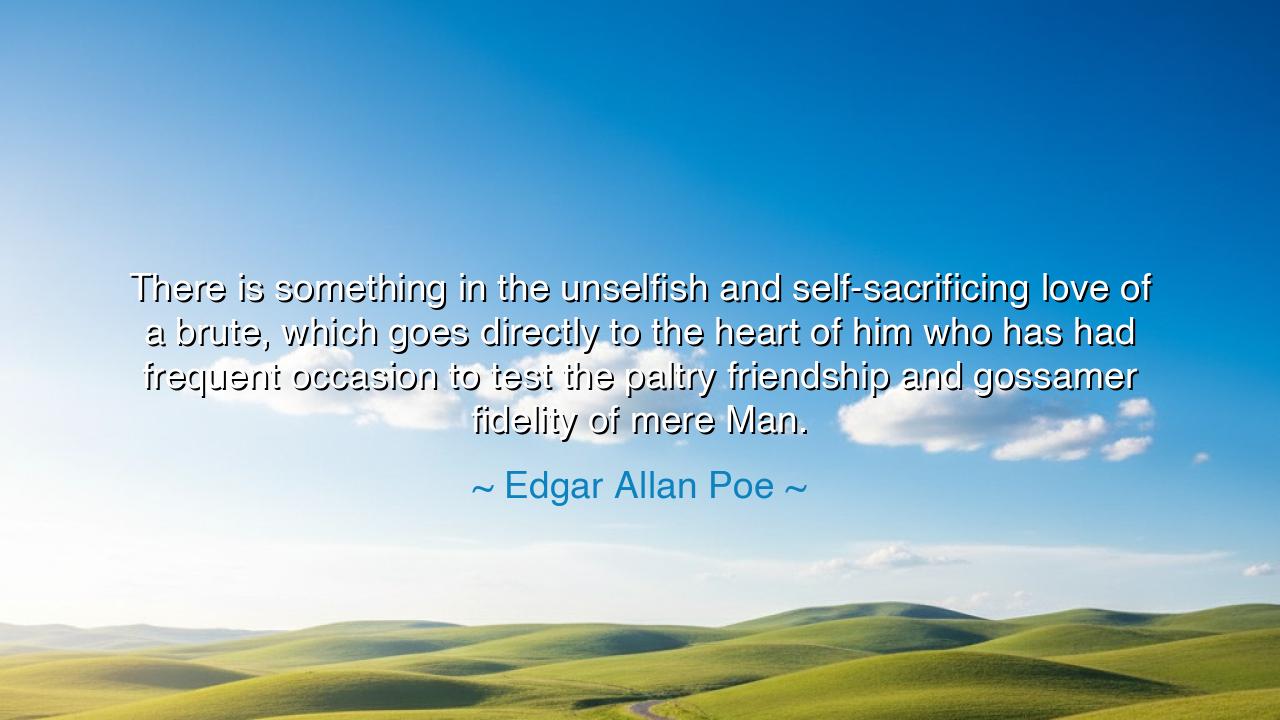
There is something in the unselfish and self-sacrificing love of
There is something in the unselfish and self-sacrificing love of a brute, which goes directly to the heart of him who has had frequent occasion to test the paltry friendship and gossamer fidelity of mere Man.






"There is something in the unselfish and self-sacrificing love of a brute, which goes directly to the heart of him who has had frequent occasion to test the paltry friendship and gossamer fidelity of mere Man." Thus spoke Edgar Allan Poe, the somber poet of the human soul — a man who peered into the shadowed corners of the heart and found both horror and truth. In this line, drawn from his tale The Black Cat, Poe does not merely speak of animals; he speaks of the divine essence that dwells in creatures without guile — the unselfish, self-sacrificing love of beings who do not calculate affection, who love without expectation and remain faithful without condition. Against such purity, the paltry friendship and gossamer fidelity of mankind appear fragile and vain — spun of pride, convenience, and self-interest, easily torn by envy or neglect.
In the old writings of the ancients, animals were seen not as lesser beings, but as messengers of nature’s wisdom. The horse carried heroes into battle, the lion guarded the gates of kings, and the dog stood as a symbol of loyalty and guardianship. In every age, those who observed with clarity saw in beasts the virtues man himself too often abandoned — simplicity, constancy, and truth. The brute, in Poe’s lament, is not brutish in heart, but noble. It loves without deceit, while man, with all his intellect and art, too often loves with motive. Thus, Poe reveals a sorrowful irony: the creature man calls “beast” often embodies a purer humanity than man himself.
One need only recall the tale of Hachikō, the dog of Japan, who waited each day at the Shibuya station for his master’s return — long after the man had died. For nine long years he waited, through rain and snow, his eyes fixed upon the road that would never again bring his beloved companion home. The people came to marvel at him, yet his faith was not for spectacle. It was love — silent, steadfast, without reward. Compare this, Poe would say, to the fickle affections of men, who pledge eternal friendship and turn away when storms arrive. The fidelity of the brute is not woven of words, but of heart; it endures beyond loss, beyond death itself.
Poe himself was a man acquainted with betrayal and solitude. The world, which delighted in his genius, offered him little warmth. He saw how men, in their paltry friendships, often seek gain rather than goodness, and how loyalty evaporates when hardship arrives. It was in the gaze of a loyal animal — a dog, a cat, a creature incapable of deceit — that he found solace. There is, as he said, something in such love that pierces the heart precisely because it is untainted. It reflects what man once was — or perhaps what he was meant to be — before pride and ambition dimmed his spirit.
This self-sacrificing love of the animal holds within it a mirror for mankind. The brute does not measure the worth of the one it loves. It does not ask for gold, for fame, or for perfection. It forgives the hand that strikes it, guards the home that forgets it, and gives its life for the master who may not even deserve it. Such devotion shames the heart of man, who so often withholds affection until it is safe or convenient. The brute, pure in its instincts, lives by the ancient law of nature — that love is service, not possession; giving, not demanding.
It is said that when Alexander the Great’s horse, Bucephalus, died after years of carrying the conqueror into battle, the king wept openly and built a city in his memory. The world may remember Alexander for his empire, but the wiser soul remembers him for that tear — the tear that recognized the unselfish loyalty of a creature that had served him not for power or glory, but for love alone. Such moments remind us that affection uncorrupted by pride is sacred.
Lesson: Poe’s words teach us that true love and loyalty are not measured by intellect, but by purity of heart. In the humble affection of animals, there is an image of divine truth — a reminder that the greatest friendship is one that gives without demand, that loves beyond reason.
Practical action: Let every man and woman learn from the brute. Love those around you not for what they give, but for who they are. Be steadfast in your friendships, constant in your affections, and gentle to those who depend upon you. If you have an animal in your care, cherish it — for its trust in you is holy. And if you would honor the wisdom of Poe, then let your heart be faithful not only when it is easy, but when it is hardest. For in loving as the unselfish creature loves, you will draw nearer to the nobility that all mankind was meant to bear.






AAdministratorAdministrator
Welcome, honored guests. Please leave a comment, we will respond soon